Look Back: Icee Hot, a Bay Area Club Culture Moment
An interview with San Francisco club organizers Icee Hot, originally published in 2015.

I have complicated feelings about memorializing parties and club nights. The club is, or should be, a purpose-built space that exists outside of time (and reality) altogether. Ephemerality and temporality are part and parcel of such experiences, and in a real sense, to document the club is to defang it.
Nevertheless, club nights, parties, and raves are where electronic music culture is forged, refined, and distributed, and to resist their memorialization often means our cultures' stories go untold—or worse, are left to be reclaimed and rewritten.
All that to say: Nine years and eleven months ago, in January 2015, San Francisco-based club night and label Icee Hot threw their final party, a 28-hour blowout, taking over both rooms of the multipurpose venue Public Works. For myself and everyone I know who attended, it was a legendary night (and day and then night again). One for the books, as they say.
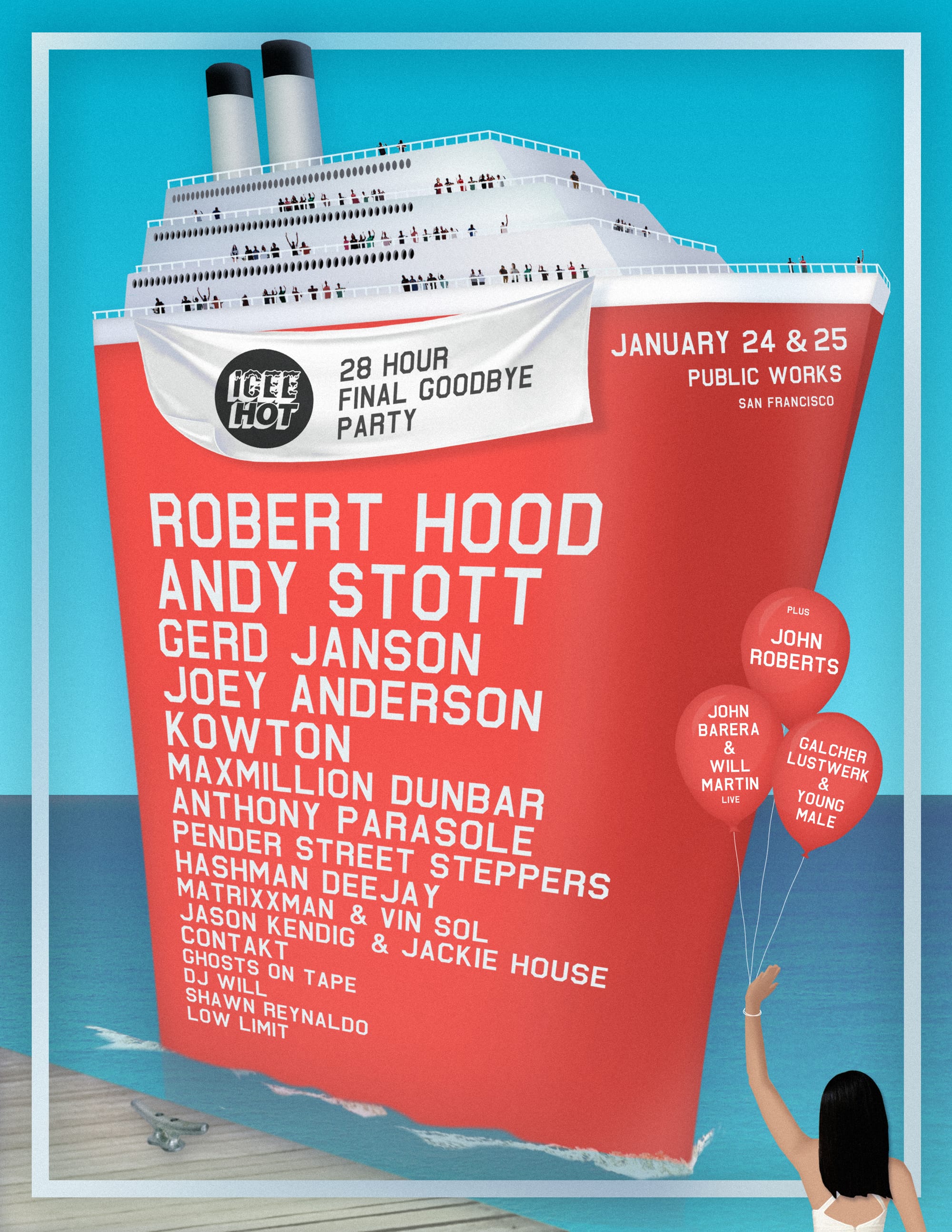
I'm republishing this interview with three of the Icee Hot core members—Will Fewell; Ryan Merry, with whom I later co-founded Vague Terrain; and Shawn Reynaldo, who writes and publishes the First Floor newsletter—mostly because it's fun to look at their flyers and reminisce, but also to consider how much has changed in the intervening decade-plus.
In 2010, when Will, Shawn, Ryan, and Bryant Rutledge (who designed all of their flyers) launched Icee Hot, the after-dubstep, UK garage-inspired, house-flavored club music they presented was very much a niche concern in America. Fifteen years later, suffice it to say that things have changed. Club music and DJ culture have exploded into the mainstream, and numerous artists Icee Hot debuted in San Francisco are now global stars who command festival-sized audiences: Jamie xx, Bicep, Objekt, and Ben UFO among them.
But that's a story for another day. For now, dive into this snapshot of Bay Area club culture, and if you have them, look back on your memories of their marathon closing party—hazy as they might be.
CZ
How did you meet? What was the genesis of Icee Hot?
Will Fewell [aka Rollie Fingers]
I started making Shawn smoothies, actually.
Shawn Reynaldo
That's way too early. I was doing Tormenta Tropical at the time. It was right around the time UK funky [bouncy house music from Britain] was coming out. This was 2009. I was playing some of that stuff at [Tormenta], because a lot of it had this tropical swing to it, but it was like, Oh, this is something different. At Tormenta Tropical we booked L-Vis 1990, Bok Bok, and stuff like that. Will and I were talking—
Will
Making him smoothies. Tropical smoothies.
Shawn
I remember when Bok Bok and L-Vis were here, Will and I toured them around for several days, they gave us a bunch of music, and we were like, Oh, this is music we're excited about that no one is playing. Will was like, You should start a new party! If you start a new party I'll help you do it. Except he had never DJed before. Part of the deal is that I had to help teach him DJ, which I did.
Will
I knew Ryan because he had done a remix for Lemonade [an artist formerly based out of San Francisco], and also I had talked to him a little bit about having a record coming out with a remix from Roska! And he wasn't really aware of how cool that was.
Ryan Merry [aka Ghosts on Tape]
I was definitely kind of aware of it, for sure. It was something I was interested in but not following heavily.
Will
And Ryan lived with Bryant (aka Low Limit, from Lazer Sword), who worked with Tim [Saputo], the former graphic designer at XLR8R, who Shawn worked with.
CZ
When did you start booking guests?
Will
The second party. The first party was just residents and it was totally good—it was rammed.
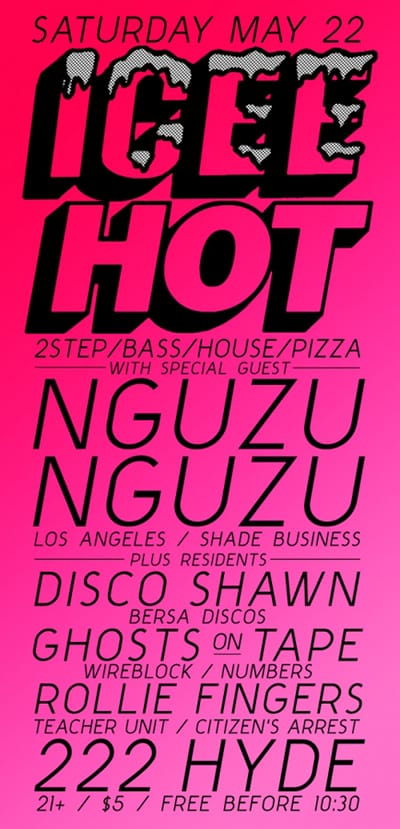
Shawn
Lines down the block and all that. 222 Hyde [a now-shuttered underground club in the Tenderloin with superb sound and a 150-person capacity] isn't hard to fill up.
Will
The second party we booked Martin Kemp, who had made basically one record. He had this track called No Charisma that was very weird, very unique. Kind of what we wanted. He had never been to the U.S. We told him, Don't worry dude, this is gonna be good. Our first party was good.
Shawn
It was a huge flop. There were like 40 people there.
Will
Looking back, I took a photo—I took a picture of this guy who walked in off the street in the Tenderloin, he's got this long beard and a cowboy hat—and I just remember him dominating the dancefloor.
Ryan
Rob Zombie-looking dude, tearing it up on the dancefloor.
Will
And I was sadly grateful for him.
Shawn
Then we had this moment where we said, Oh wait, [success] isn't automatic.
CZ
Did you have a schedule? Was it a monthly?
Shawn
Yeah, we always had a monthly party. The first few parties were fun, but the first booking that we really felt good about was Todd Edwards, July 2010.
Will
It was his first time playing in San Francisco. It was kind of his resurgence—he had just quit his job at Verizon, he was really trying to make a go for it, and we ended up developing a relationship with him just because he's such an amazing guy.
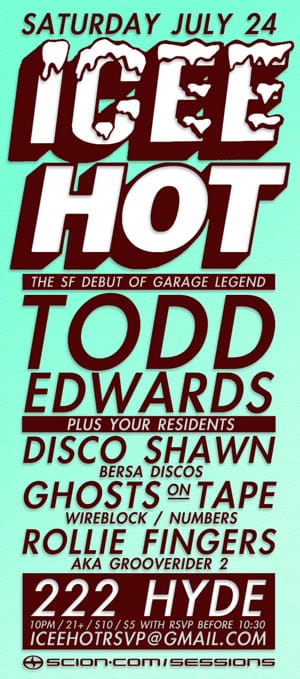
Ryan
I was shocked that nobody had booked him before. There were people there with records for him to sign. This guy, as far as the development of what became 2-step and garage, he's a huge deal. A forefather. He had never been here before. I was like, This is crazy. How is this possible?
Will
At the time, he said, It's so nice to meet fans of my music who are American.
Shawn
It was definitely one of the first times he had played in the US. Now he plays all the time.
For our one-year anniversary, we booked Kode 9 [founder of Hyperdub] at 222 [Hyde], and 222 got shut down by the fire marshal two or three weeks before the party. Then we moved to SOM [Bar, then Slate, which is reported to be permanently closed]. That wasn't the best venue where we did the party, but the one-year anniversary was huge.
Will
That transition to SOM, though, was the period when we were booking our most bizarre lineups.
CZ
Like who?
Will
Like Egyptrixx, Brackles, and Oneohtrix Point Never.
CZ
That was the first Icee Hot party I noticed, and I was like—Who the f*** is doing this?
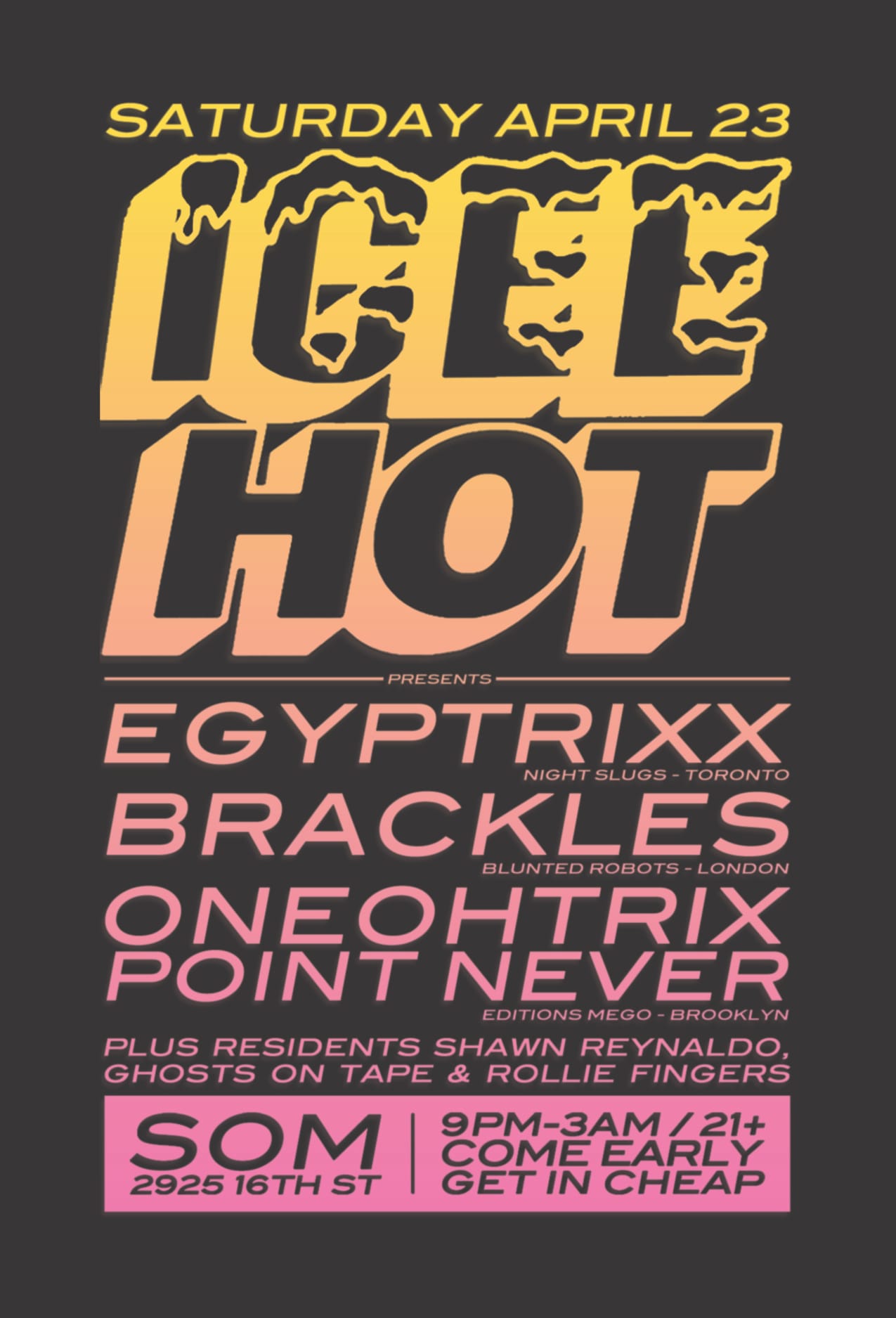
Shawn
One thing that we've done with the party is a lot of people played their first shows in San Francisco [for Icee Hot].
CZ
I feel like you guys broke a lot of sounds in San Francisco.
Will
I wouldn't say broke sounds, because there were already people listening to it—
CZ
But putting together a space where all these people who are listening to this stuff can come together—you know, that was me. I used to listen to these guys and think: Damn, I wish there was a place I could go out and dance to this.
Ryan
I think that's kind of what we wanted to do. We saw that nobody was booking this stuff—at least in San Francisco—and thought, Why isn't it happening here? There's clearly a demand for it, these are great artists…
Will
We were also a little bit naive about what was going to go over well.
CZ
In what ways were you naive and what did you learn over the course of this whole process?
Ryan
I think we still don't know. [laughter]
Shawn
Well, one thing I've always said is that Icee Hot is a completely selfish enterprise. We book stuff that we like and would like to see in a club setting. Thankfully, enough people have come over the five years that we've been able to keep doing it. Not every party works, but enough of them do.
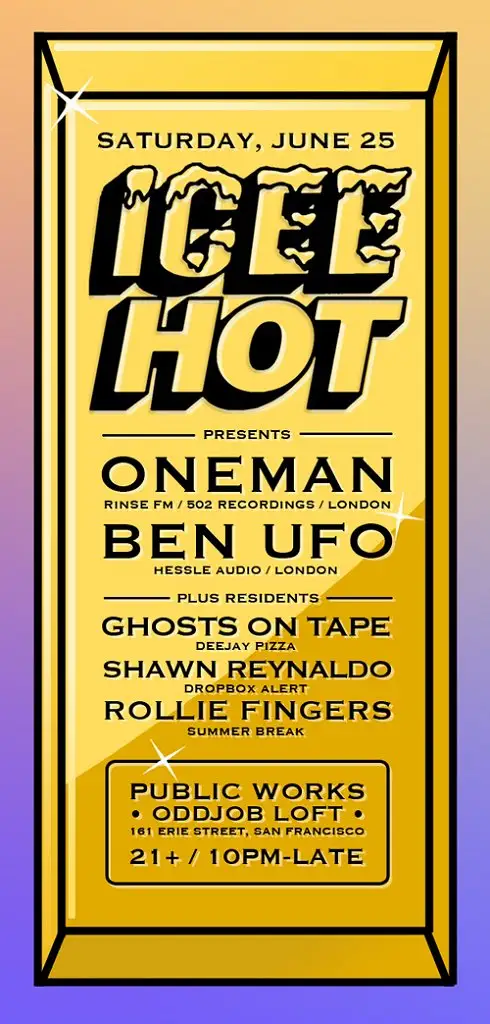
Will
But we've had so many conversations where we say, We can't book that person … and then we end up doing it.
Shawn
One thing I've learned about booking is that you can't necessarily trust that just because someone is on Resident Advisor, or XLR8R, or has one cool record out—that's good for 20 dudes that buy records to come out. You really have to think bigger and pay attention to what people are talking about, artists that have a sound that ties into sounds that work in San Francisco.
Ryan
That's the hard part. Once we had been doing parties for a little bit, it got to the point where we were like, Who else do we want to book? Now it's gotten to the point where it's unrealistic to bring someone out, because they live in Europe and it's so expensive to get them out here—or obscure acts that nobody knows or cares about. The tough part is to try to find a balance.
CZ
When did you make the shift to larger clubs?
Shawn
We moved to Public Works in 2011, after they had been open about six months. When it started, it wasn't necessarily a venue that worked with promoters doing cutting edge music—it was a lot of Burning Man stuff, big room stuff. So we waited until they opened the Loft, because we said, Oh we can't do the main room. Our party's too small. So as soon as they opened the Loft, we were one of the first promoters to get in there. They kind of gave us a monthly slot, and now everyone does parties at Public Works, but at the time, it was a new thing. And they were super supportive. Even though we've had slow parties, there's never been a talk with us where they said You really need to step it up.
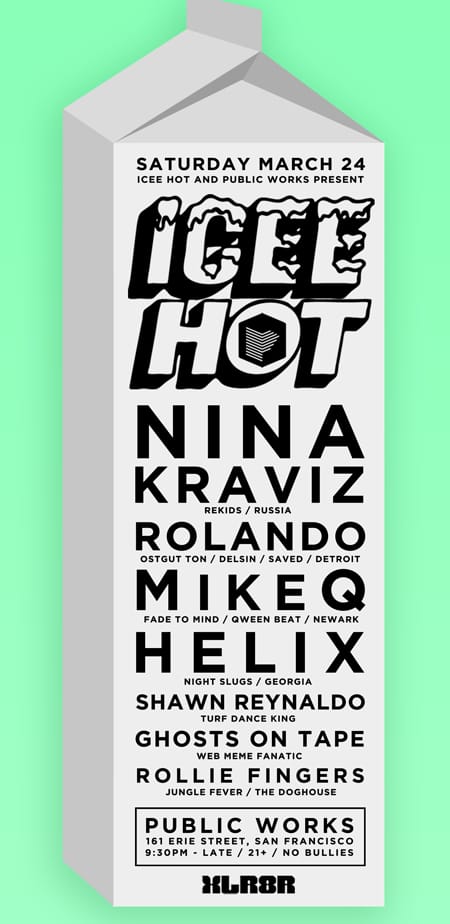
Will
I don't think we really would have been able to pull it off [without Public Works].
CZ
The venue is an integral part of the experience. What did you learn over the long process that you've been doing this?
Ryan
With Public Works, the guys that are running it, they understand the role of the space in the broader sense of the culture. There's a lot of clubs that don't really care—they just want to get a bunch of people in there and sell a bunch of liquor. Whereas Public Works, they want to help this place be a hub of underground culture in San Francisco. They understand that there's a desire for it, and that makes it so much easier for us to be able to do what we do.
Will
And you definitely get a tone of respect from them. It goes all the way from the bar manager of the night, the bartenders, the door people, and everyone there—it's almost like they're in agreement that this is, you know, maybe not a mainstream event, but they supported us.
Shawn
I think another thing is that we always made it very clear to them that we didn't care about making money. They understood and appreciated that, and what we were trying to do, and let us do it.
CZ
What did you want Icee Hot to look like? Were you emulating anything, or were you completely flying blind?
Will
I had no idea. I had no idea.
Ryan
We just knew there was a lot of exciting music out there, but there was nowhere to hear it.
Shawn
We were excited about all the UK stuff at the time, and I think a lot of people initially thought of us as a “UK bass” party, but at the same time we were always playing old house, old rave music, Omar-S and MK. It's kind of been constantly evolving, which is one of the nice things about it.
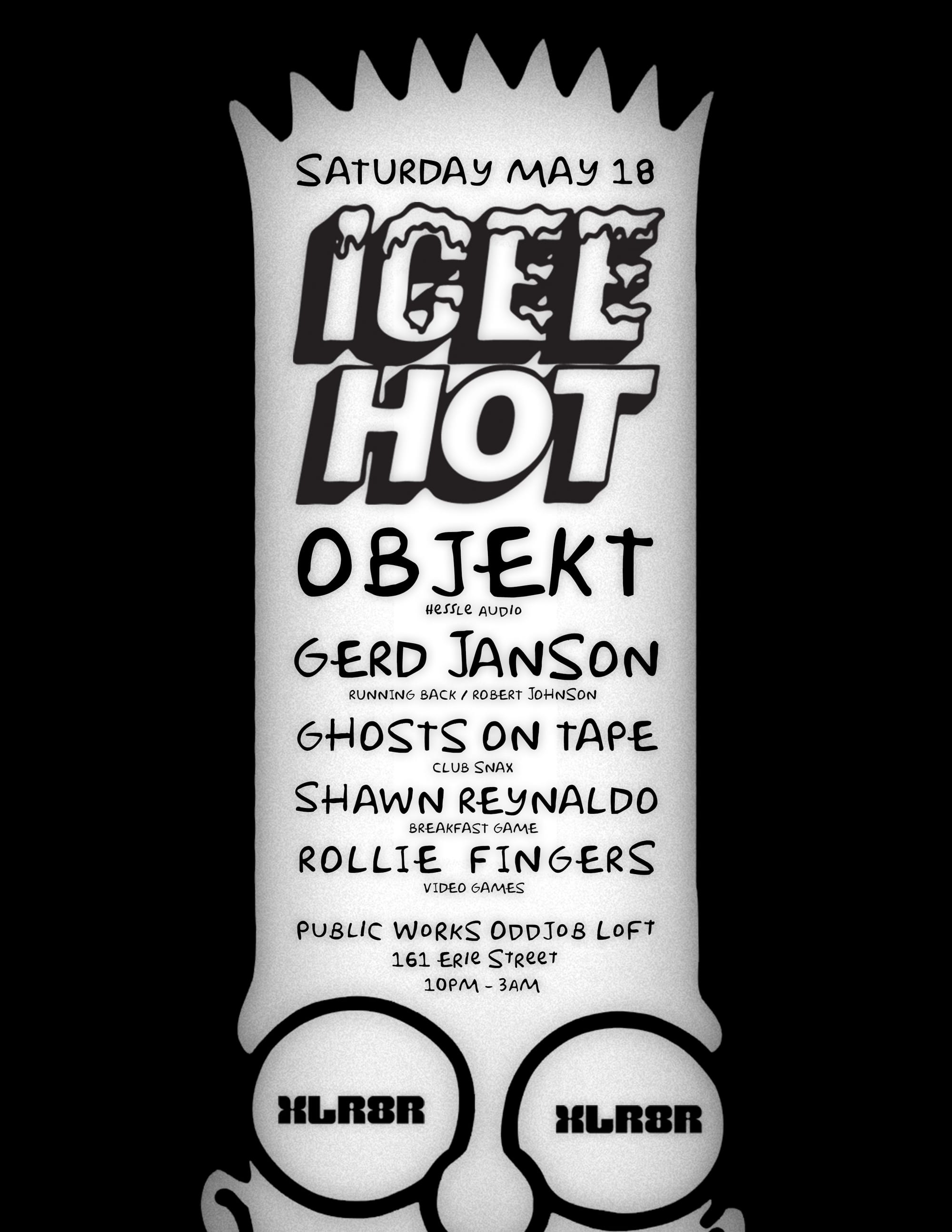
Will
Our DJing has evolved, too. We've talked a lot about being promoters, but we've grown as DJs and worked on our craft, and we all take that part of the party really seriously. If anything has been an inspiration that we've modeled ourselves after, it's our own DJ sets. Come to think of it, that's the main driving force behind the party—booking who we love to play.
CZ
What was the high point of Icee Hot over the five years? After doing this for five years, what are you guys taking away?
Ryan
For me, it's the label that I'm most proud of. The parties are great and it's an experience, but when you come away from it, it's just a memory. The label is something that's gonna be around forever—it's our chance to put our own mark on the history of dance music. This is what we were into, this is what we were about. Something that's going to stand the test of time.
Shawn
For me, it's not one, but the fact that so many of my favorite DJs came and played in San Francisco for the first time because of us—whether it's Ben UFO, Gerd Janson, John Talabot …
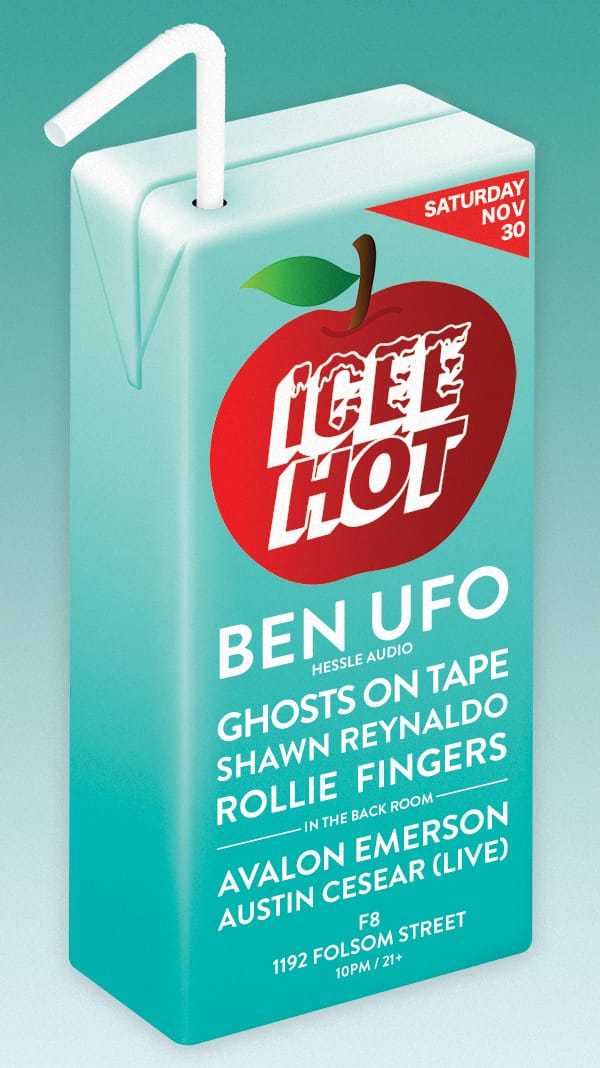
Will
We haven't even talked about those people. Those are total cornerstones, those three.
Shawn
Not only did they come and play for the first time at our party, but they came and understood what we were trying to do—a lot of these guys have been willing to play for reduced fees because they heard about our party and what we were trying to do.
Will
And it's been a shock to see how sweet these people are. I don't have one nightmare story about a guest who was a terror, or was really wasted, or did something weird. All of them, for the most part, are people who make fantastic music, who are fantastic artists, and are just really great people.
Ryan
And they're fans of the music. They are interested in helping to create something cool and worthwhile.
Shawn
I do like to think it's not a coincidence that the artists we've gravitated towards are artists that are about music. Everyone says they're about music, but it's obvious that not everyone actually is. One of the biggest themes we've talked about in the past year or so is sincerity—our party is not about being ironic, or being funny, or even being cool—it's just good music, no bullshit. And we book artists whose music that we like, and it turns out, they oftentimes share our values about these things. The parties they want to play are the kind that we're putting on.
CZ
If you could do it all over again, what would you do differently?
Shawn
I would have tried to take a better survey of the club landscape before we started. When we started, we didn't know a lot of the other promoters in town, and the first couple years we ran into situations where our party was on the same night as other people, and stuff like that. In the last couple years I've made a real effort, and other promoters have too, just talking to each other—What night are you doing a party? And if we had done that earlier, it would have made things a little smoother initially.
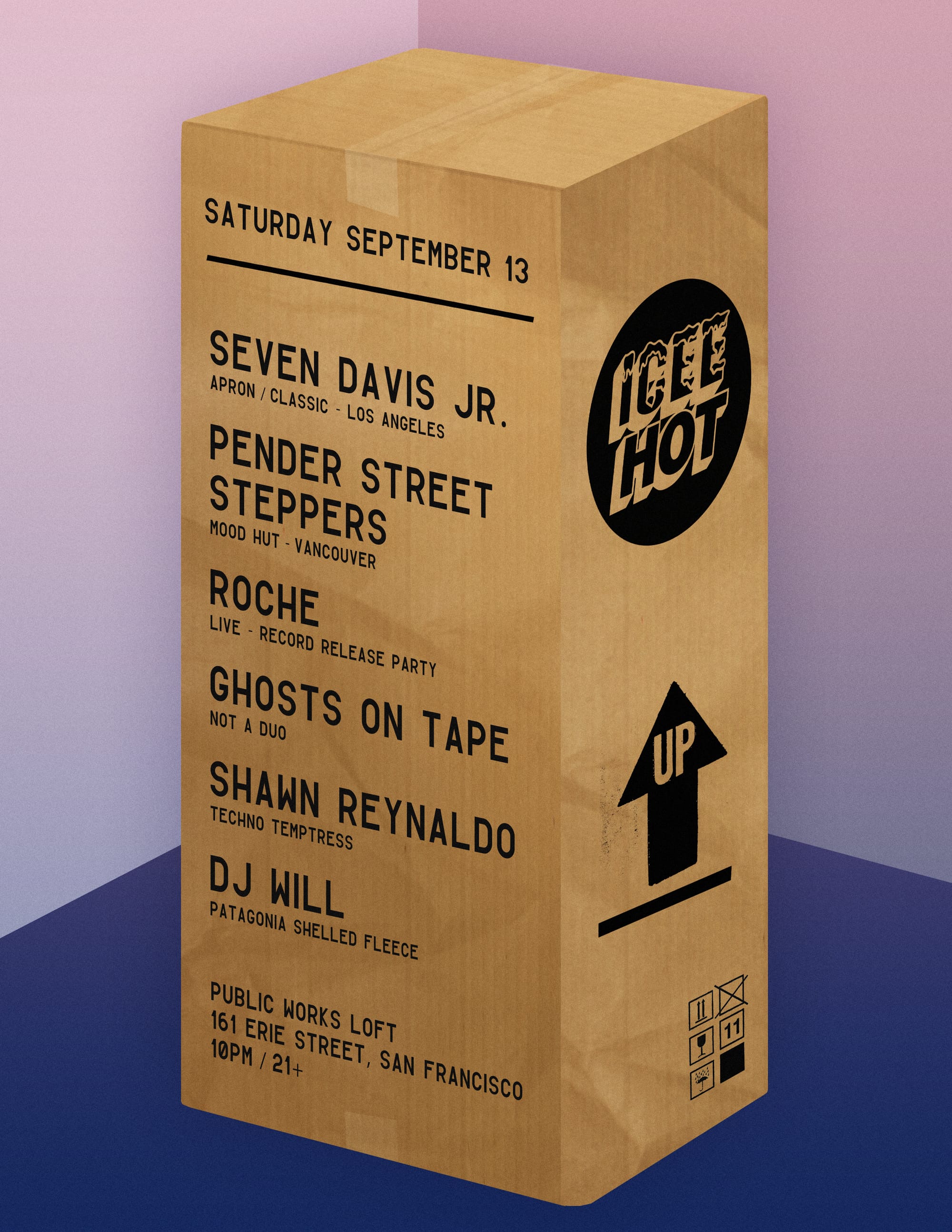
Will
I know what my answer to this question is. I would not have agreed to always be the opening DJ.
[laughter]
Will
When you're starting out every party at 95 BPM…
Ryan
But you got super, super good at it!
Shawn
And with the record label, learning more things about distribution, pressing plants, all that kind of thing. The label has been 100% us just doing it because we want to. We've lost money on every single release. I don't have a problem saying that on the record. But at the same time, we'll do things, like, Oh, we'll just get Robert Hood to do a remix, or John Talabot to do a remix.
Will
Those are great stories, actually.
Ryan
Having to mail a CD of the parts [of a track to be remixed] to Robert Hood's home address in rural Alabama…
Shawn
Because he doesn't use a computer.
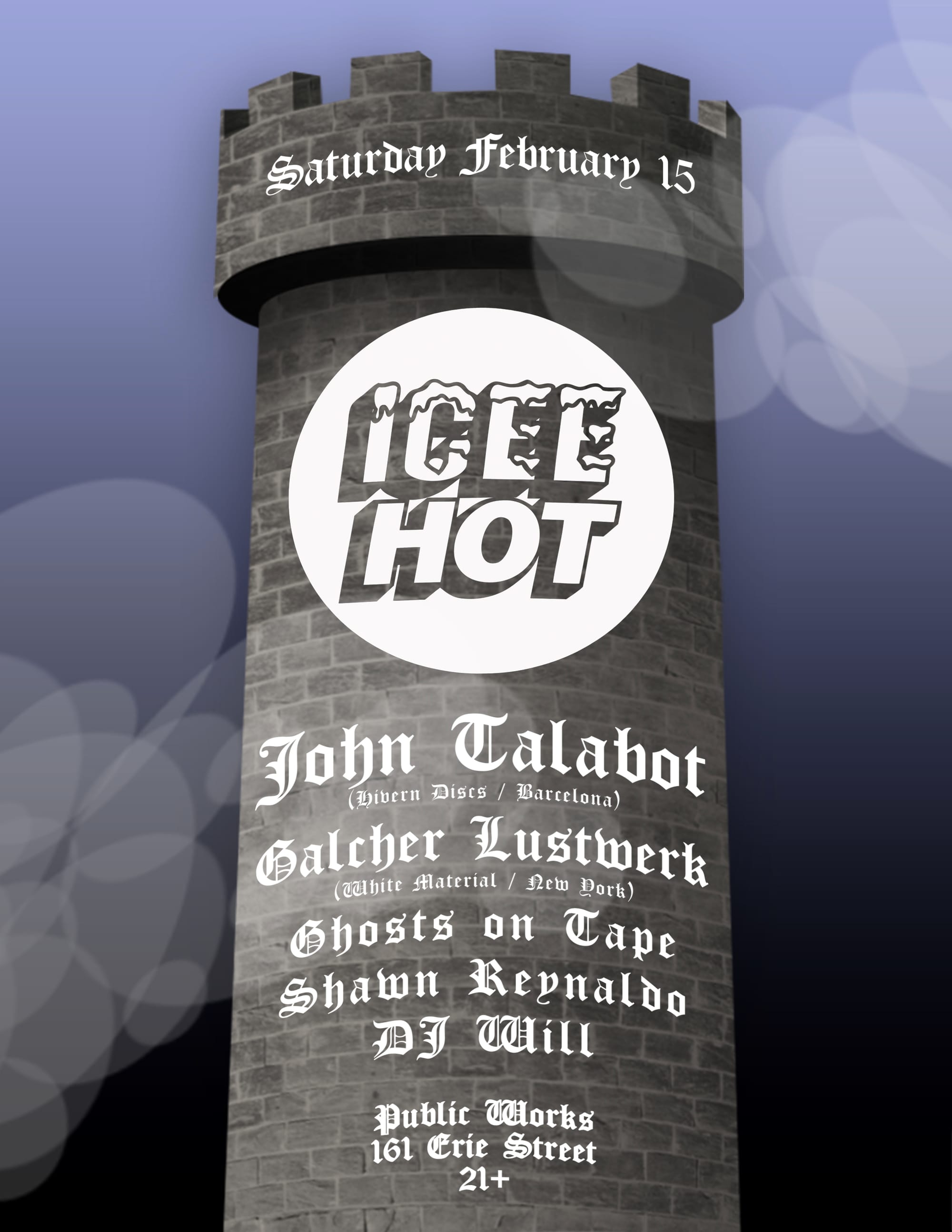
Ryan
I had to put a CD-R, inside of a mailbox, like it was 1998.
CZ
What was the most crowded party?
Ryan
I think the most crowded party was Galcher Lustwerk and John Talabot. I knew that John Talabot was pretty popular, but the extent of how many people were there … the amount, and how crowded it was, so early …
Shawn
Honestly, the first Icee Hot was absurdly crowded. When it was just us. I remember trying to walk to the bar and having to walk underneath people, basically. And I should stress that these are all the exception to the rule.
Will
I really loved the four-year anniversary with Levon Vincent, Joey Anderson, and Floating Points. Levon had played in the city before, including with us, but when he ended that party, he was like, I really feel like I connected with San Francisco. Which was wonderful. And then the one that we did with Honey [Soundsystem], the Dance Mania thing.
Ryan
To have Paul Johnson, Jammin' Gerald and Parris Mitchell at our party, was… literally a teenage dream come true. I couldn't believe I was a part of it. Paul Johnson was one of the first DJs who actually changed my life when I saw him at a rave in St. Louis in '99.
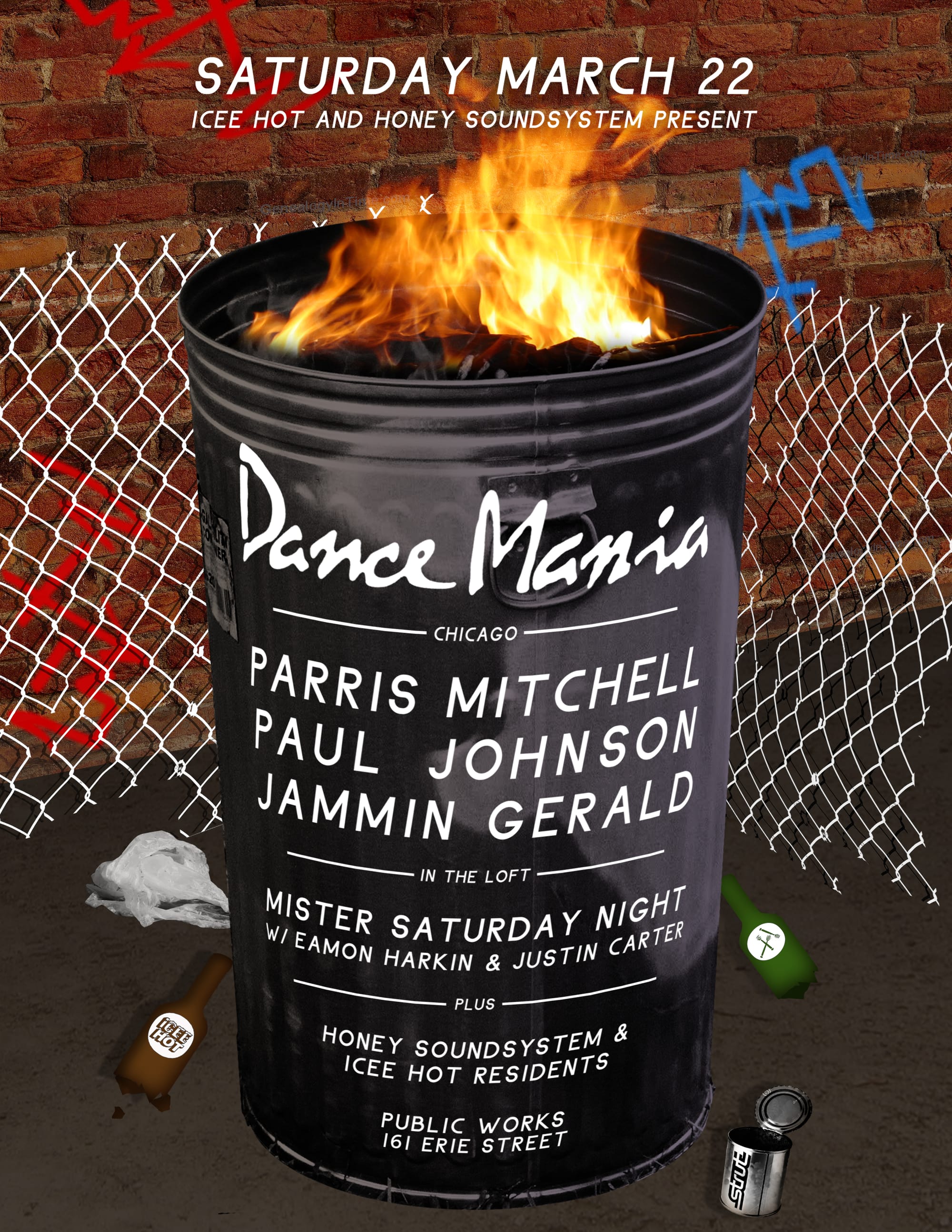
Will
And the logistical endeavor of that party was really an added fun thing, you know. That's what doing a party with Jacob [Sperber, co-creator of Honey Soundsystem] is like. In order to do this, you have to go on this treasure hunt through San Francisco …
Shawn
He told me, I need you to go to Magazine [a store in the Tenderloin that sells vintage magazines]. I need you to buy vintage porn, as much as you can, for thirty bucks.
Will
With him, it's a weird control thing, you know.
Shawn
So I went into the store, running around, ten minutes before it closed. I had to go up to the front counter and say, Where is your pornography?
Ryan
The cheapest porn.
Shawn
So then the clerk said, Straight or gay? And I said … Some of both? Then he pointed me towards this raggedy pornography section, looking for the ones with the most pictures and the least articles.
Ryan
I should also put into context, if you're going to print that, that we were using these for decorations.
Shawn
So then Jacob cut the pictures out and made a … banner, custom flags. Custom pornography flags that he then strew around the club.
CZ
Who's your graphic designer?
Ryan
Bryant. From day one.
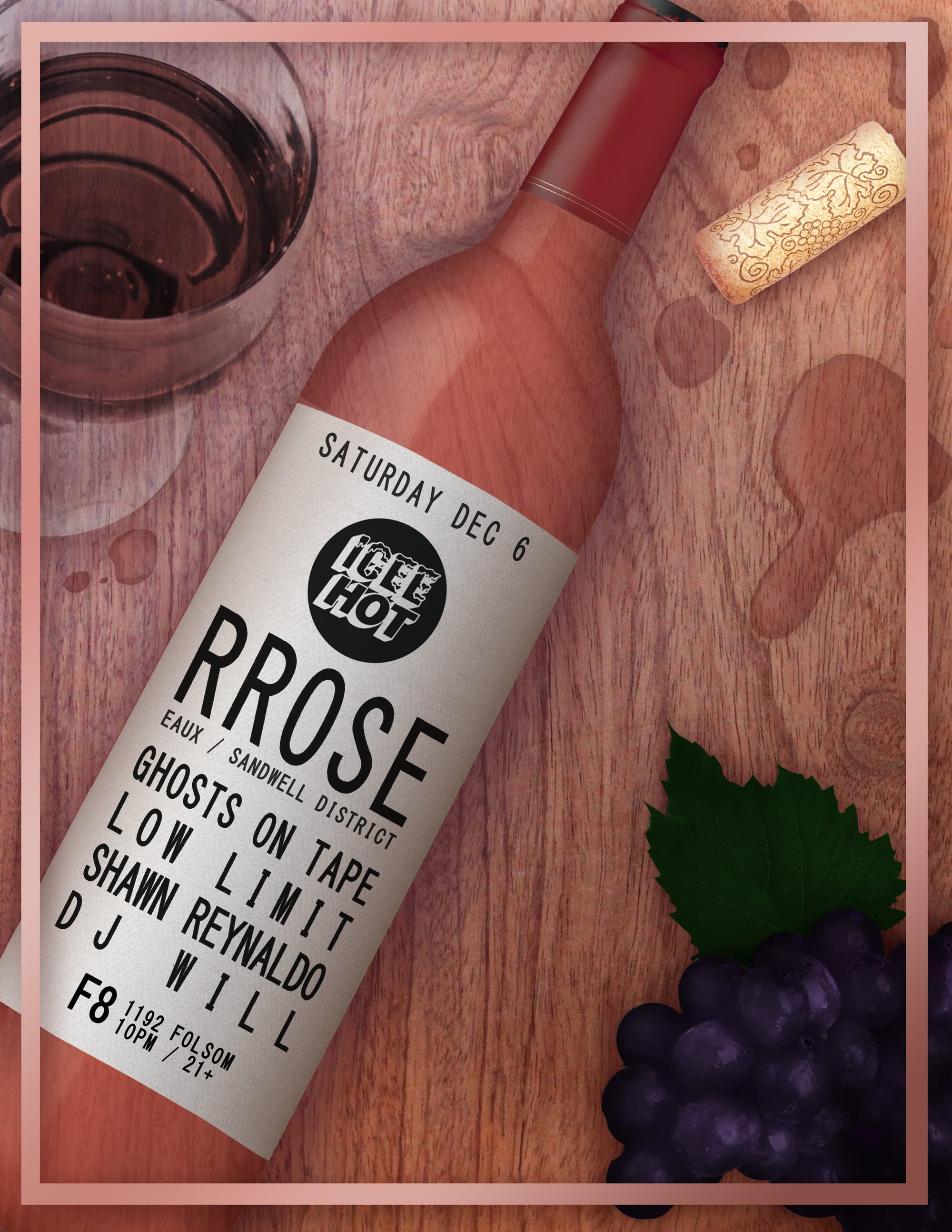
Will
With me, you know, growing as a DJ, Bryant has grown as a graphic designer. The first flyers, he was like, Oh I did a gradient, here. But then, we had already been doing these long flyers, and then for a warehouse party we did with Total Freedom and Star Eyes, he just added a chimney on top, and a door at the bottom. And we were like, That is brilliant. He's definitely an artist, an all-around artist, and he really just grew into this thing where he would make an object and make you think about this mundane object in a new way, and kind of love it.
Ryan
Even though Bryant doesn't DJ with us often, he's 100% responsible for the visual identity of our party, which sets the feeling for what we're trying to do.
Shawn
To cap it off, my impression of the parties—it's not just a beard-stroke fest. People dance, and it's fun, and we're doing it because we love music and enjoy it and want to create an environment where people can have fun.
Ryan
And that's exactly what it's for.
